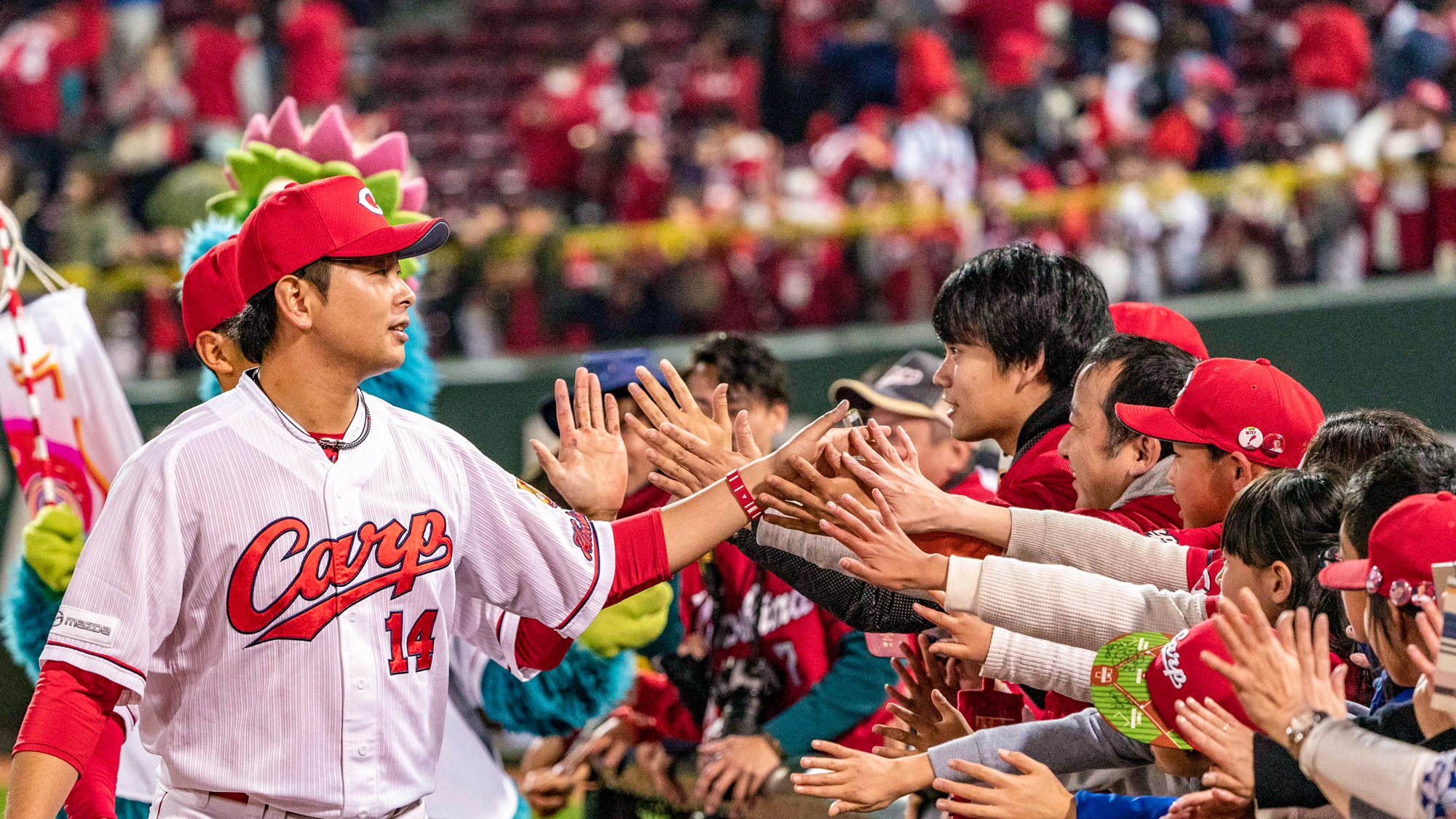
INSPIRE
HEART OF HIROSHIMA

INSPIRE
HEART OF HIROSHIMA
The loyal baseball fans of the Hiroshima Toyo Carp team embody the community spirit of a city. Zoom-Zoom investigates.
Words Shogo Hagiwara / Images Keisuke Ono, main image ©HIROSHIMA TOYO CARP
Dating back to the 1920s, Mazda’s relationship with the modern city of Hiroshima is synonymous with community, innovation, and a true, hospitable omotenashi spirit (putting others before oneself). Found everywhere from local coffee shops to burgeoning factories, and rippling through its hardworking community, Hiroshima’s uplifting atmosphere can be felt by anyone lucky enough to visit.
Yet, of Hiroshima’s population of over a million, there is a group of citizens who capture Hiroshima’s spirit more passionately – and more colourfully, owing to the swarms of red baseball jerseys seen on any game day – than anyone else: the dedicated fans of the Hiroshima Toyo Carp baseball team. Watching Hiroshima Toyo Carp play up to six games a week at its home ground, Mazda Zoom-Zoom Stadium Hiroshima, both the team spirit and the stadium itself have become shining examples of Hiroshima’s local community, as endemic to the city and its hardworking people as Mazda itself.
Cheered on by the fans, famously the most passionate in the game, the Hiroshima Toyo Carp is one of 12 teams divided into two separate leagues: the Central and Pacific Leagues. From Hokkaido in the north to Fukuoka in the south, the teams battle it all out throughout the regular season, which is followed by the most anticipated Japan Series championship playoffs to decide the ultimate season winners.

Daichi Ohsera (left) and Takato Hiraoka (right) pose for a photo with a Hiroshima Toyo Carp fan before a game. (Photo taken on 23 November 2018, ©HIROSHIMA TOYO CARP.)
“The ambience inside the stadium was simply overwhelming, with all the avid fans chanting.”
DAICHI OHSERA, PITCHER, HIROSHIMA TOYO CARP
For the team, which has 70 players under contract, a fan-to-player relationship is vital. Daichi Ohsera, Hiroshima Toyo Carp’s pitcher, is all too happy to confirm.
“After I finished university baseball in 2013, I visited Hiroshima on holiday and had a chance to watch the Hiroshima Toyo Carp at the Mazda Zoom-Zoom Stadium Hiroshima,” Ohsera recalls. “The ambience inside the stadium was simply overwhelming, with all the avid fans chanting so loud for their team. I thought I knew the Carp fans were special, but it was obvious that I had underestimated it. Having experienced that first-hand, I started thinking that I would like to play professionally for a team like Hiroshima with so much love from the fans.”
Ohsera’s wish to play for the Hiroshima Toyo Carp was granted immediately thereafter, and he’s now cemented his status as the team’s ace pitcher. Staying at the top of the game as a pro athlete is, however, far from easy.
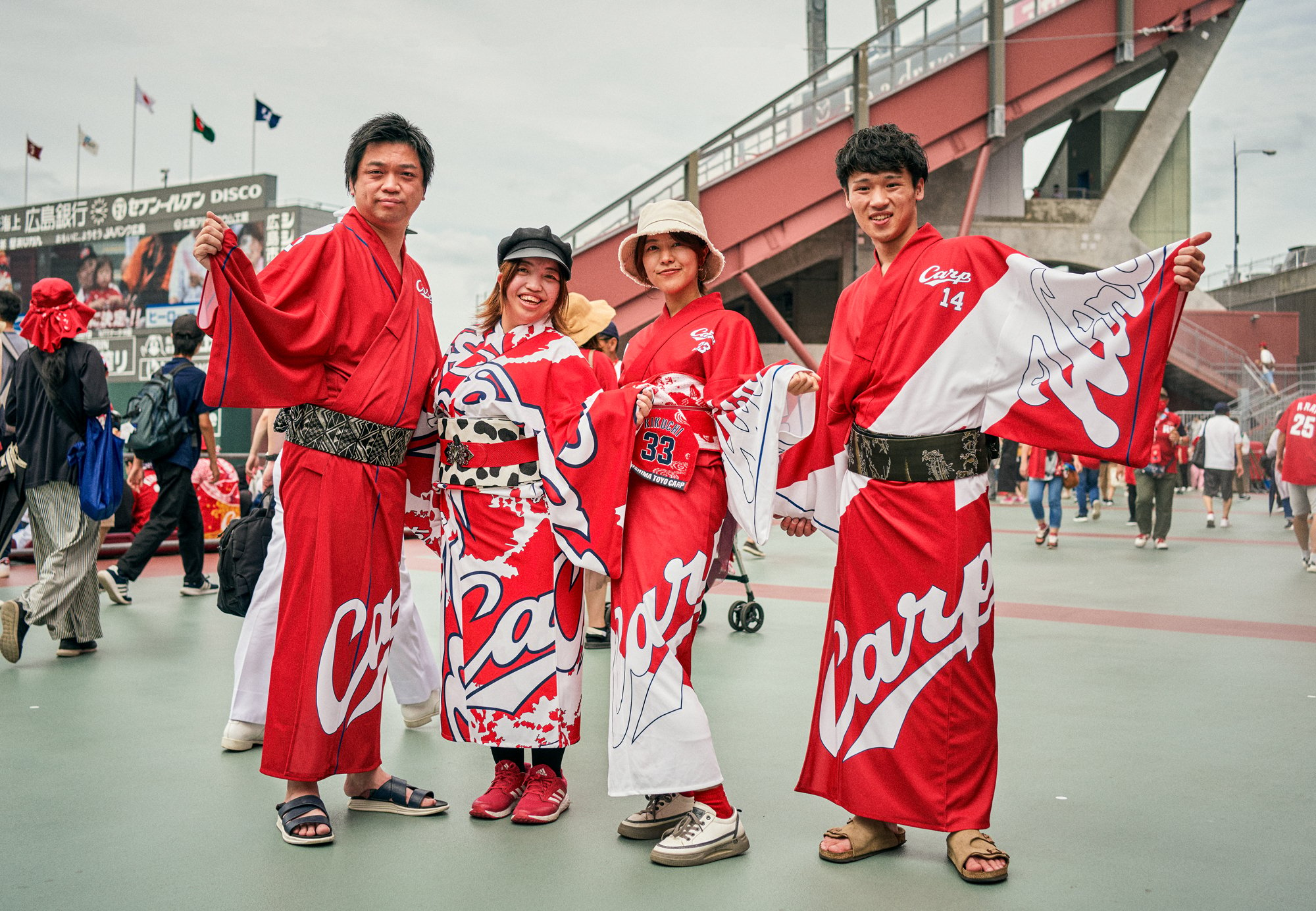
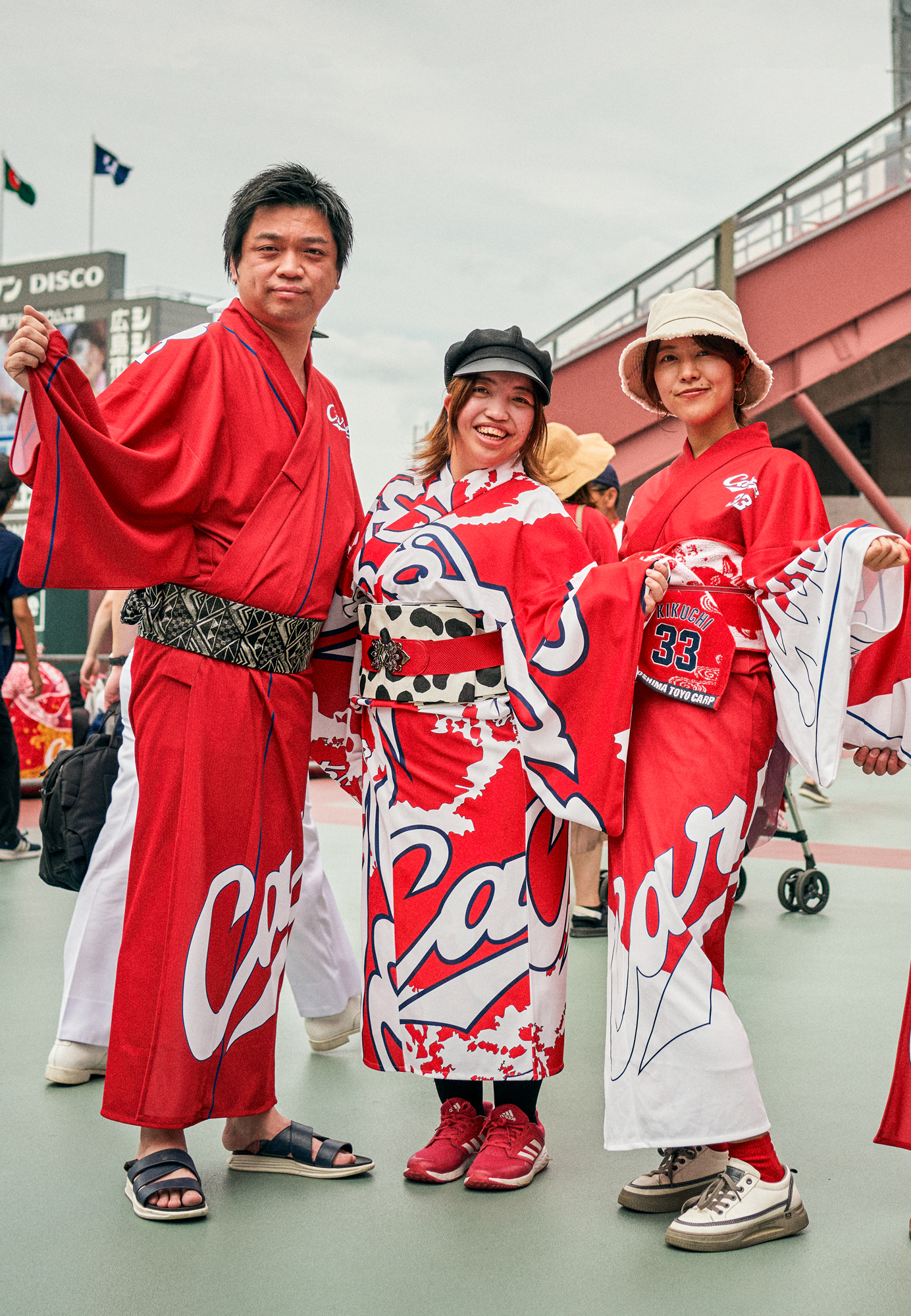
Eitetsu Hoshino, Erina Oshita, Kodai Nakamura, and Akiho Okamura in their Hiroshima Toyo Carp-inspired kimonos.
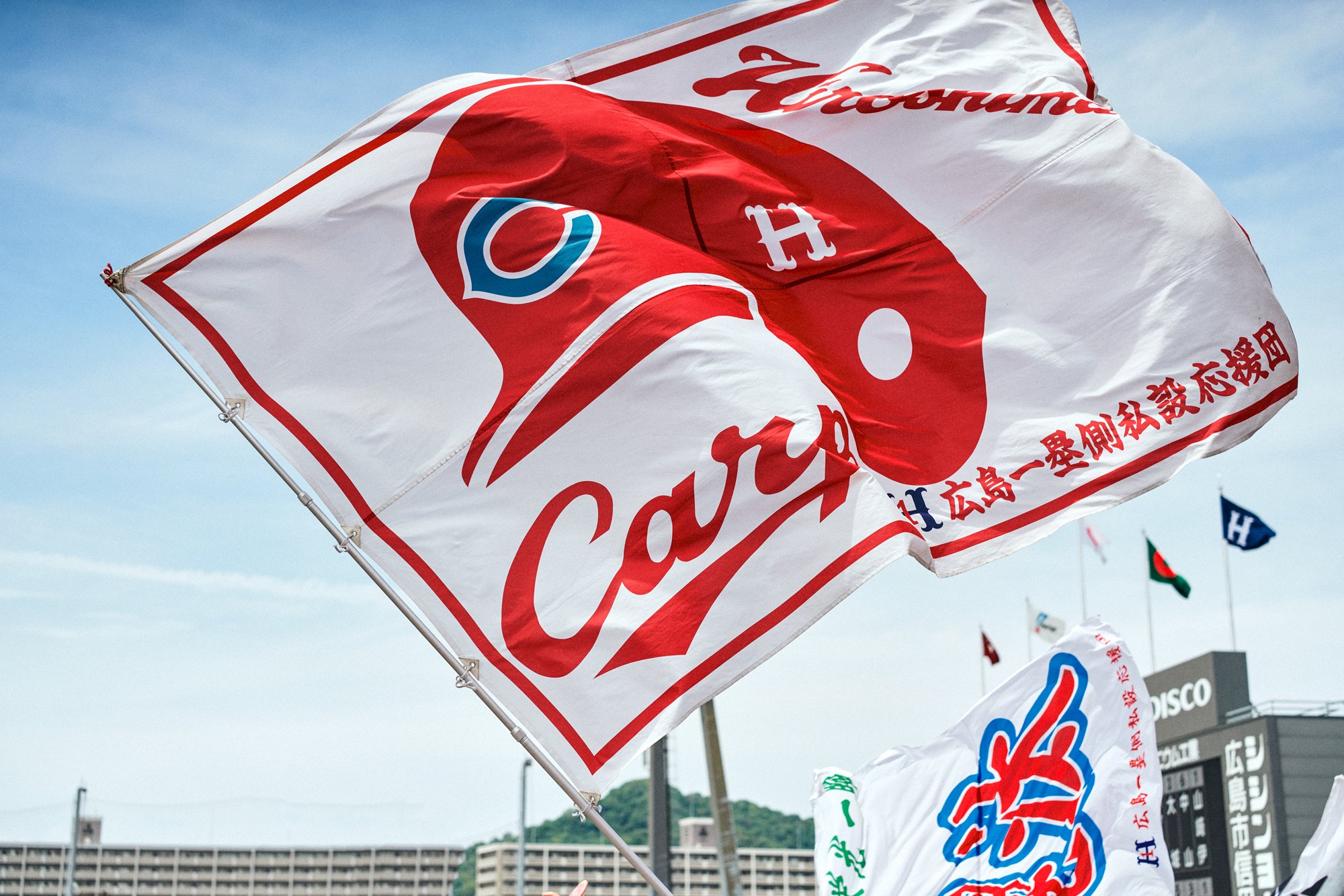
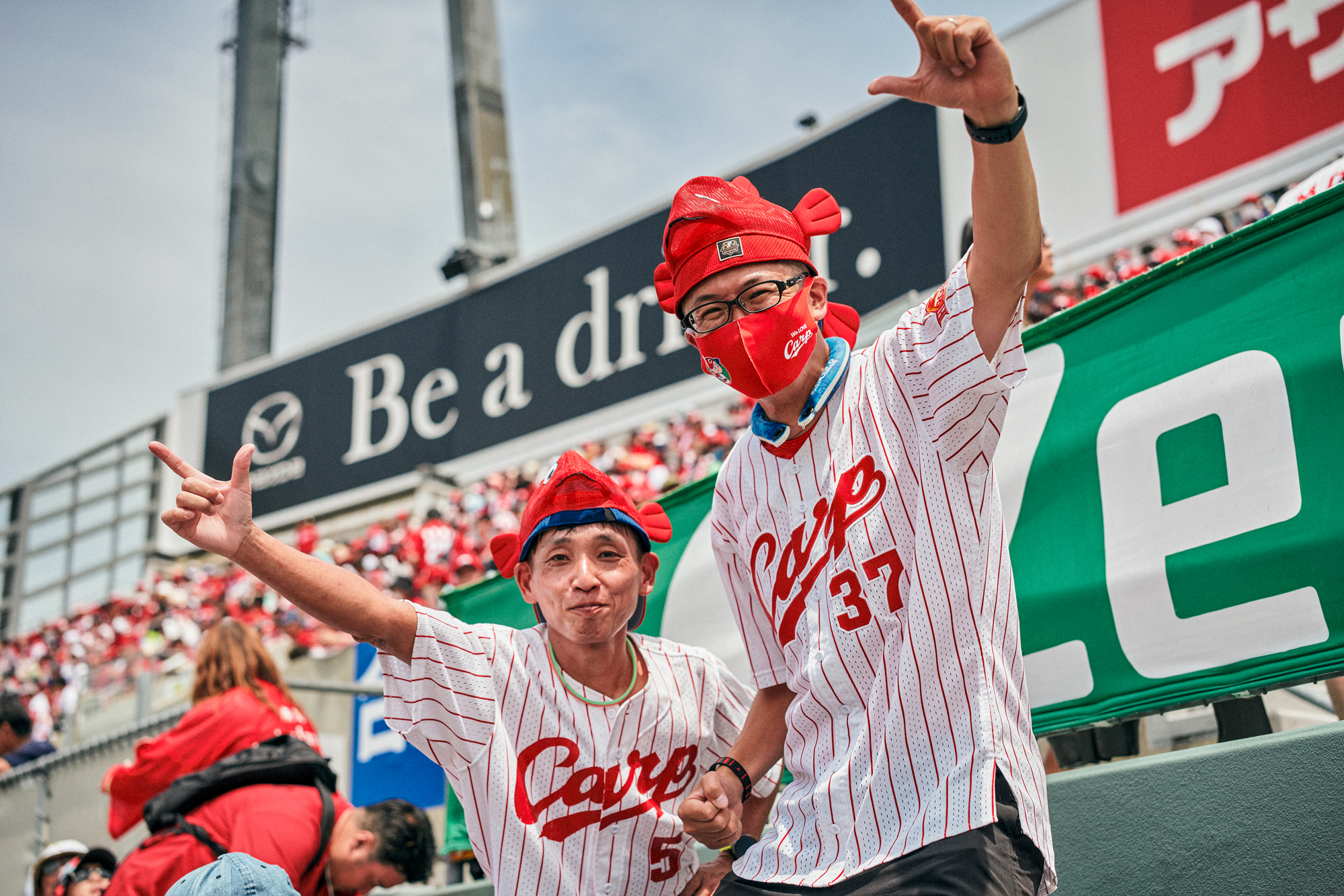
Local fans Daisuke Fujii and Masatomo Imazawa cheer from the bleachers.
“There are more downs than ups for sure; to the point where I sometimes feel like I just want to hang my glove up right then,” says Ohsera, jokingly. “But, when I fall on hard times, I try to think that I’m playing not for myself but for the fans, my teammates, staff, and others working very hard behind the scenes for the team. This way, I can work even harder and boost my motivation to become a better player tomorrow than today.”
This beautiful relationship between the team and the fans is also true beyond the walls of the home stadium. Ohsera continues: “Away from the ground, we have fantasy camps and events organised throughout the year to mingle with our fans. What was memorable for me from last year was a particular camp where we invited kids from single-parent families. This season, we went ahead and invited those same kids to an actual game with their parents, hoping that it would help further strengthen their parent-child tie through baseball.”
With the team’s history, legacy, and long-standing success, it’s almost impossible to pinpoint what makes the Hiroshima Toyo Carp fans so unique, compared to the rest of the pack. One theory is that the Hiroshima Toyo Carp came to prominence in tandem with the city’s recovery from the war, which most likely plays a part in the narrative. There is, however, more to it than that.
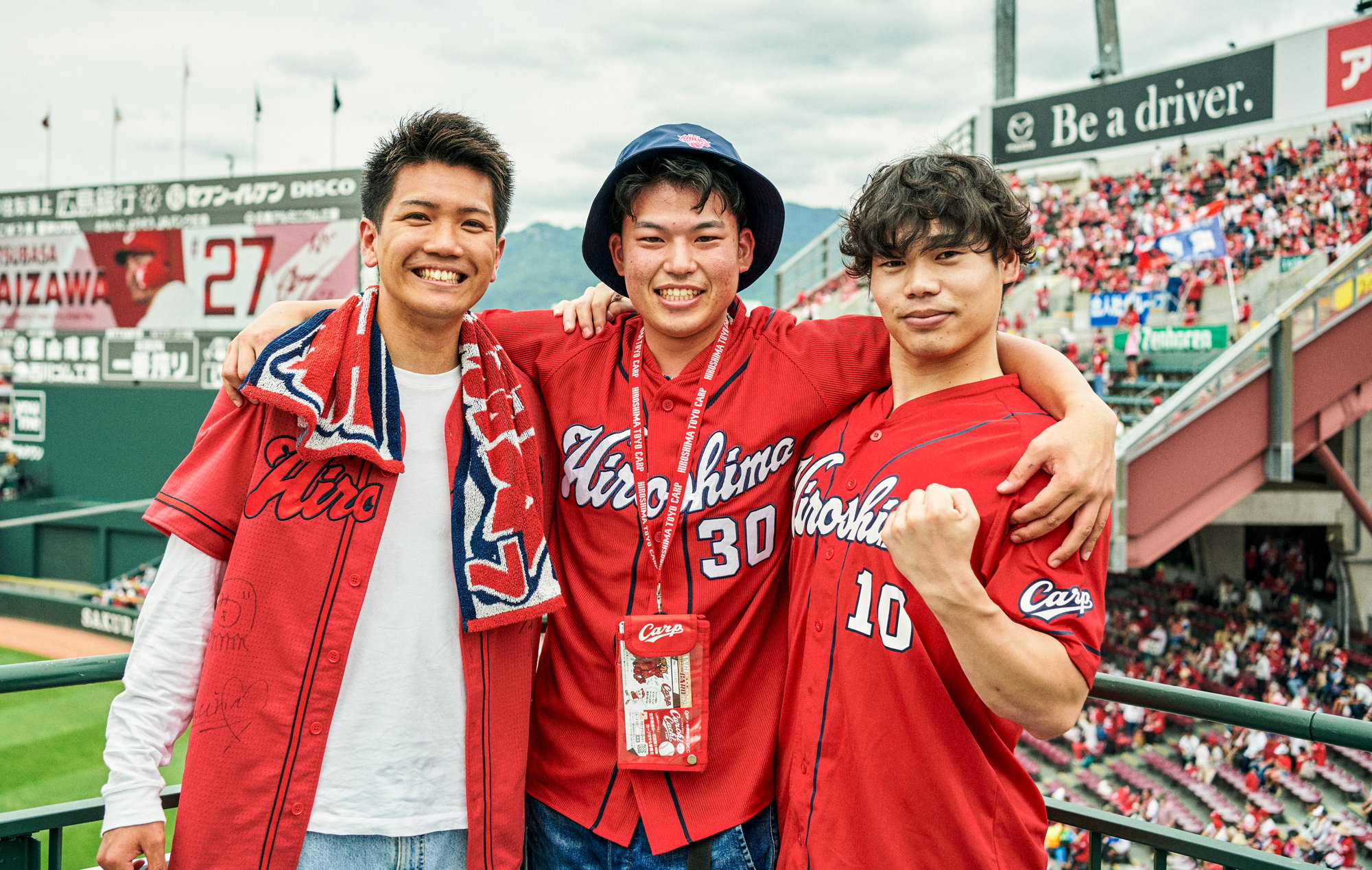
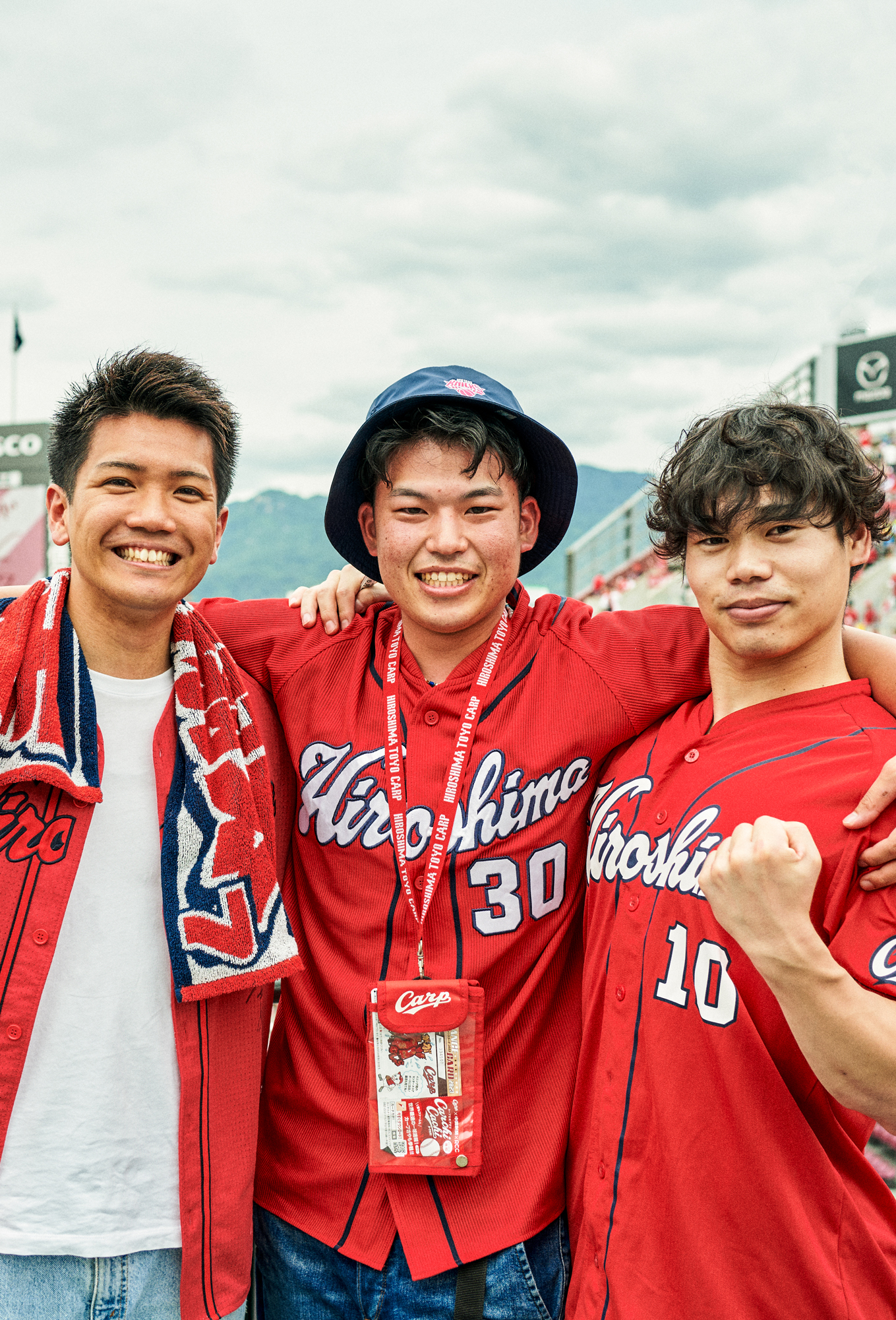
Friends Yuta Hashimoto, Chiharu Nagai, and Hikaru Sato at the Mazda Zoom-Zoom Stadium Hiroshima.
Ryosuke Muta, CEO of yakitori grilled-chicken-skewer restaurant chain Carp Dori, is the perfect example of a steadfast and resolute Hiroshima Toyo Carp fan. Founded in 1980 by Muta’s father, Carp Dori is most famous for naming its chicken-skewer dishes after the Hiroshima Toyo Carp players. If, for example, you were to place an order for Ohsera, you would get a plate of grilled chicken skins, one of Carp Dori’s most popular dishes. This restaurant always has a special place in the hearts of like-minded fans, and plenty of them make a pilgrimage there whenever they have a chance.
“Our everyday life revolves around the Hiroshima Toyo Carp.”
RYOSUKE MUTA, CEO, CARP DORI
“The very existence of the Hiroshima Toyo Carp is woven into the fabric of the city,” says Muta. “For us, it’s not a conscious choice [to support the Hiroshima Toyo Carp]. It’s rooted in the collective conscience of the people in Hiroshima. If you turn on the television, you will always see news about the Hiroshima Toyo Carp. If you walk through the city, you will see the streets adorned with the posters and billboards of the players. If you want a baseball cap, then it would have the logo on it. Our everyday life revolves around the Hiroshima Toyo Carp. Nothing less, nothing more, and it feels only natural for us.”
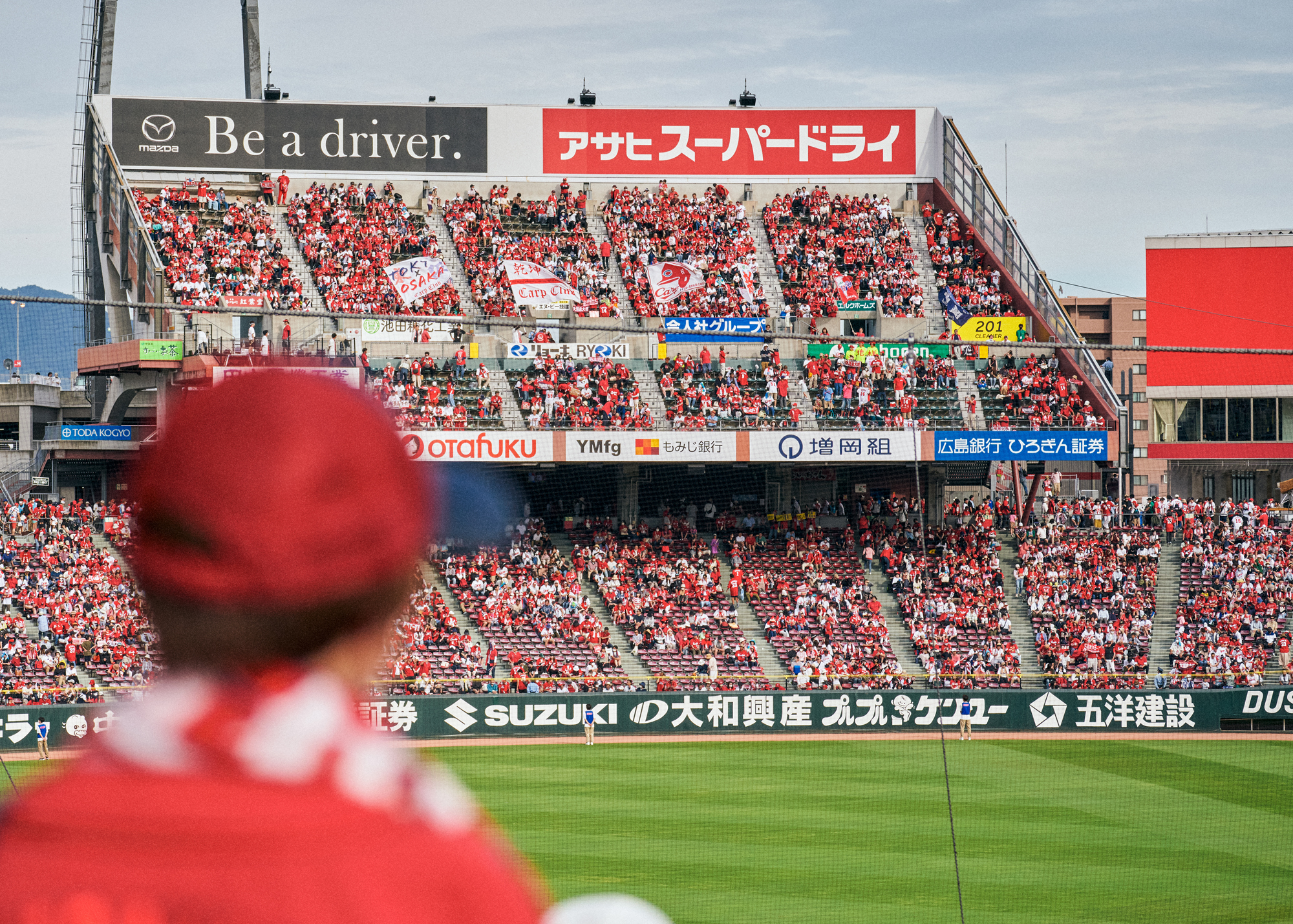
The Mazda Zoom-Zoom Stadium Hiroshima can seat up to 33,000 fans.
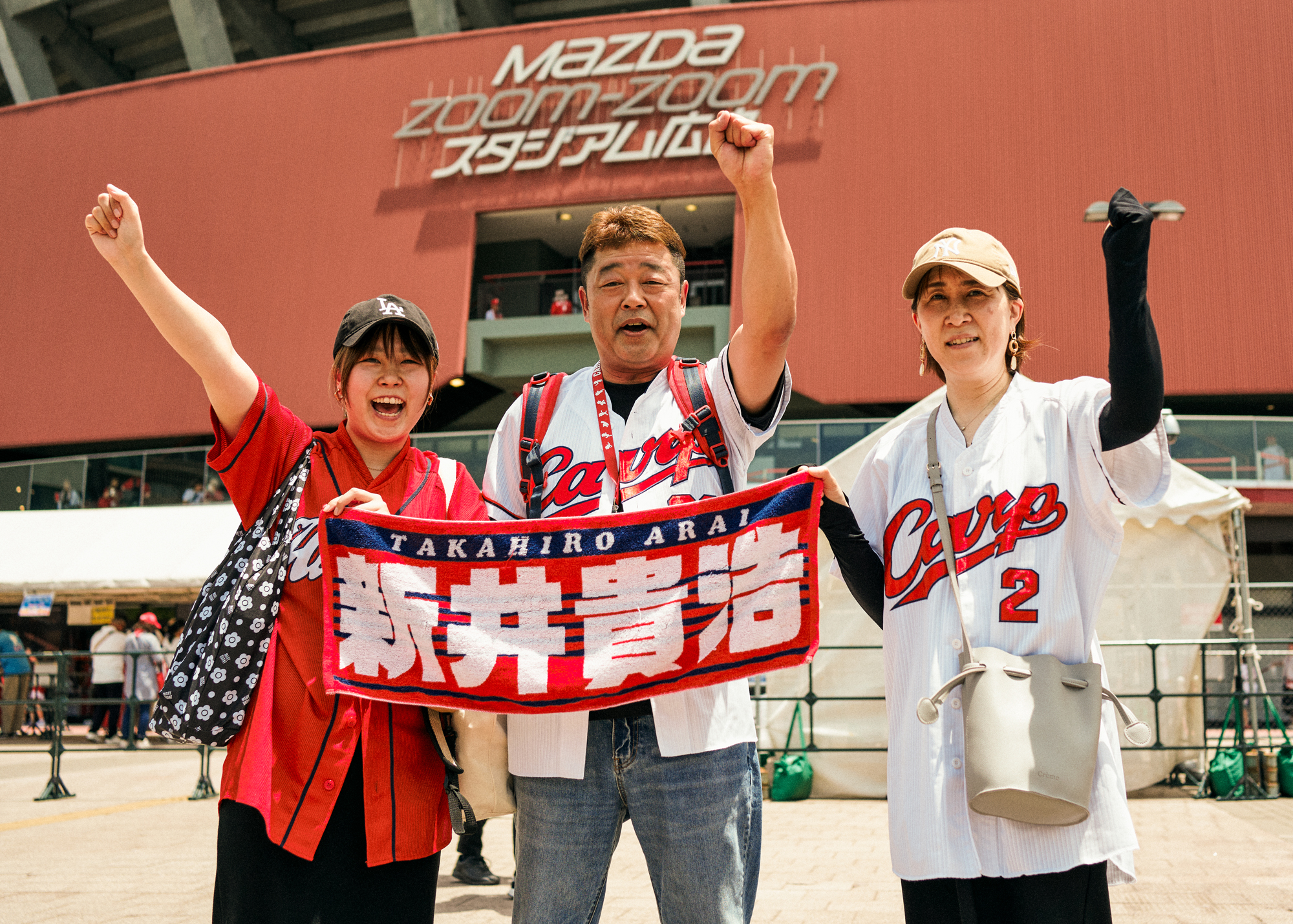
Rie, Yasunori, and Yui Shimizu outside the Mazda Zoom-Zoom Stadium Hiroshima.

Ryosuke Muta and Takuya Hayashi at Carp Dori, a restaurant bedecked in Hiroshima Toyo Carp memorabilia.
In fact, if you visit the Mazda Zoom-Zoom Stadium Hiroshima on game day and speak to the fans there, you will see that what Muta has revealed is nothing but the truth. “Anything about the Carp always gets us talking at home and everyone in the family joins in,” says Yasunori Shimizu, who was at the stadium with his family to watch the Hiroshima Toyo Carp play Tokyo’s Yomiuri Giants, the team’s arch-rivals from the capital. “It’s something that runs deep in the family through the generations.”
His daughter, Yui, jumps in. “I love the [Hiroshima Toyo] Carp because my grandpa and grandma loved them,” she exclaims. “Not only that, the whole team feels very close to us both physically and spiritually, with the players and even the Slyly [the team’s mascot] acknowledging us in the stadium whenever they have a chance, making sure we’re all well entertained and looked after. That really shows how special our mutual relationship is at the [Hiroshima Toyo] Carp.”
This seems to be the consensus among the Hiroshima Toyo Carp fans, whoever you end up speaking to in and around the stadium. The love for the baseball team is a multi-generational, family affair that has forged an unbreakable bond over the years. So unbreakable, in fact, that the Hiroshima Toyo Carp doesn’t receive financial sponsorship, as many professional sports team do, from a corporate sponsor. Rather, it was a multitude of generous donations from Hiroshima locals that saw the team both survive financial hardship in 1952 and adopt a community-funded approach. The only baseball team in Japan to do so, the Hiroshima Toyo Carp remains without third-party sponsorship some 70 years later.


Kimi Komiyama and Yumeno Imada cheer on the Hiroshima Toyo Carp before a game (above). A fan wears a towel with embroidery of Kikuchi Ryosuke’s uniform number as a kimono Obi band (below).
Yet, it’s Erina Oshita, a fan clad in a custom-made Hiroshima Toyo Carp kimono, who sums it all up for everyone involved in the baseball team, including fans, young and old, and players, from new signings to seasoned athletes. “If I’m to describe what the Hiroshima Toyo Carp means for us, then I say this: they are the soul of the city.”
As with any sport, seasons change, trophies are won and lost, and athletes come and go. The only constant, however, is the loyalty of the fans, who will cheer, celebrate, and commiserate while sitting shoulder-to-shoulder in the stadium. Rain or shine, win or lose, Hiroshima’s community spirit always triumphs.